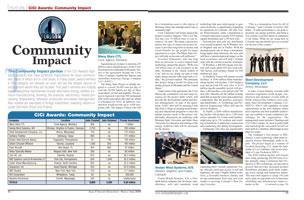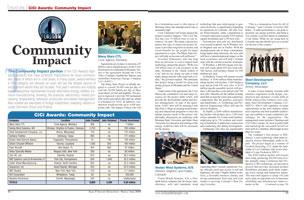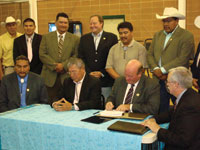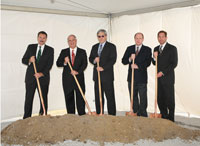
 Community Impact
Community Impact
The Community Impact portion of the CiCi Awards highlights projects that have profound implications for local communities, many of which are in rural areas. In many cases, award winners in this category are already (or soon will be) the largest source of employment where they are located. This year’s winners are notably varied. Industries represented include alternative energy, textiles, furniture manufacturing, brewing, life sciences, electronics, metals processing, shipbuilding, television production and waste management. Also notable are examples of foreign investment. Investing nations include Denmark, Brazil and Poland.
Many Stars CTL
Crow Agency, Montana Agreements are in place to develop a $7 billion coal-to-liquids project on the Crow Reservation in southeastern Montana. Parties to the agreement include the Crow Tribe of Indians (Aps Mooke Nation) and Australian-American Energy Company LLC (AAEC).
Agreements are in place to develop a $7 billion coal-to-liquids project on the Crow Reservation in southeastern Montana. Parties to the agreement include the Crow Tribe of Indians (Aps Mooke Nation) and Australian-American Energy Company LLC (AAEC).
The Many Stars Project is initially targeted to convert 38,000 tons per day of coal into 50,000 barrels per day of ultra-clean diesel, jet fuel and naphtha. The project is expected to provide 900 permanent jobs on the reservation after start up, which is scheduled for 2016. In addition, construction would provide up to 4,000 temporary jobs. The impact of these jobs will be a tremendous asset to this region of Montana where the unemployment rate is unusually high.
Crow Chairman Carl Venne praised the project's positive impacts. "The Crow Nation has over 10 billion tons of coal resources," he said. "We made a decision to pursue this type of clean-coal project because it provides long-term economic and social benefits for our people for many generations to come. The Many Stars Project will help us become self-sufficient."
Governor Schweitzer, who has long been an advocate of coal-to-liquid fuels technology, praised the project. "With over 100 billion tons of coal resources in the state, Montana is the 'Saudi Arabia of Coal' and we are doing our part to help make energy security with clean fuels a reality," the governor replied. "We anticipate this project being a model for clean-coal energy projects in Montana and the United States."
Under terms of the agreement, the Crow Nation has committed coal and water resources for the project while AAEC will provide the development capital and project management. As part of the agreement, AAEC also will be assisting Little Big Horn College in creating needed training and educational programs to meet the human resource needs of the project. Additionally, discussions are underway with Montana State University and Idaho State University for education and training of the energy workforce that will be necessary for the project.
Vestas Wind Systems, A/S
Windsor, Brighton, and Pueblo, Colorado Vestas Winds Systems, A/S, a Denmark-based company that develops, manufactures, sells and maintains wind technology that uses wind energy to generate electricity, is significantly expanding its operations in Colorado. All told, Vestas Wind Systems' entire commitment to Colorado represents a nearly $700 million capital investment and 2,550 new jobs.
Investments and jobs are distributed over several locations: one in Windsor, two in Brighton and one in Pueblo. With the unemployment rate in these communities being higher than statewide, the new jobs will have a transformational impact on the local economies, and will help Colorado cope with the current economic downturn.
In Windsor, a 400,000-square-foot factory will create about 650 new local jobs. The factory will produce blades for 600 turbines per year.
In Brighton, Vestas will operate several facilities. A $180 million blade-manufacturing facility will produce 1,800 blades a year and provide 650new jobs. A $110 million nacelle assembly factory will produce 1,400 nacelles a year and provide 700 new jobs. (Nacelles are the turbine housing units that sit atop the tower and contain key components like the gearbox, generator and transformer.) A technology and Production Engineering Office will also be sited in Brighton.
In Pueblo, a $240 million manufacturing facility will produce up to 1,000 steel towers annually for Vestas wind turbines, employing up to 550 workers and resulting in hundreds of additional construction and contracting jobs during development.
Explaining why they are significantly expanding their Colorado operations, Vestas officials cited easy access to rail and highways, the state’s highly skilled workforce, a favorable business climate, and strong commitment from state and local leaders to growing Colorado's New Energy Economy.
"This is a tremendous boon for all of Colorado," said Colorado Governor Bill Ritter. "It adds momentum to our push to diversify our energy portfolio and build a 21st century economy based on industries of the future. What we are doing here in Colorado can and should serve as a model for the rest of the country."
Steel Development Corporation
Amory, Mississippi A team of steel industry veterans with extensive experience in the design, construction and operation of mini mills in North America has formed a new company, Steel Development Corporation (SDCO). SDCO will capitalize on niche opportunities in the steel industry where steel expertise and best-available technology can combine to create competitive advantages for the organization. The management team includes chairman and CEO John Correnti. He most recently built and started-up the successful SeverCorr mini-mill in Columbus, Mississippi in less than two years.
A team of steel industry veterans with extensive experience in the design, construction and operation of mini mills in North America has formed a new company, Steel Development Corporation (SDCO). SDCO will capitalize on niche opportunities in the steel industry where steel expertise and best-available technology can combine to create competitive advantages for the organization. The management team includes chairman and CEO John Correnti. He most recently built and started-up the successful SeverCorr mini-mill in Columbus, Mississippi in less than two years.
The company’s first project is SDC Amory, a new-technology rebar plant located in Amory, Mississippi, south of Tupelo. The project began as a venture of EcoSteel Recycling, LLC under the leadership of Lou Colatriano, who is now president of Long Products at SDCO.
The $200 million facility will recycle steel scrap, producing 300,000 tons of rebar annually using Continuous Bar Production (CBP) technology, an innovative process that provides increased product flexibilities and plant yield while requiring lower energy and manpower inputs. This steel mill expects to create 150 jobs and to play an important role in hurricane rebuilding and infrastructure improvements in the Southeastern United States.
“Amory is our first example of taking a traditional steel product and creating efficiencies and competitive advantages through redefining the production process,” said Colatriano.
“We know some will question the launch of a new company in this challenging financial environment,” said Aldo Mazzaferro, the CFO of SDCO. “But the current situation has not cooled our enthusiasm – or that of our equity capital investors – for our business model. We believe this timing actually enhances our ability to capitalize on the possibilities that will emerge as the world’s economy regains its footing.”
Santana Textiles
Edinburg, Texas
Santana Textiles, the fifth largest producer of denim in the world, has chosen South Texas as the location for its first manufacturing facility in North America. Santana is headquartered in Brazil and has operated in the South American textile market for over 50 years. Its new operation in Edinburg, Texas represents an investment of $171 million. The investment is expected to create 800 much-needed jobs in a region struggling with some of the highest poverty rates in the state.
The company selected Edinburg after considering locations throughout North and South America. According to Santana Textiles President “Neto” Delfino, the company chose Edinburg because of the state and local incentives, as well as the city’s proximity to cotton growers. “After evaluating all the sites, we decided that Edinburg offered all the right conditions to expand our denim manufacturing operations in the U.S.,” said Delfino. “We couldn’t find a better partner than the State of Texas and the City of Edinburg.”
Texas authorities approved a variety of incentives. The State of Texas provided a $1.65 million grant from the Texas Enterprise Fund. The County of Hidalgo provided a $1.7 million tax reimbursement. The City of Edinburg provided a $2.5 million tax abatement. And the Edinburg Economic Development Corporation provided land and infrastructure grants valued at $5.05 million.
The Rio Grande Valley of South Texas, historically reliant on textile production for a large percentage of its employment base, was forced to transform when globalization devastated this local industry. The Santana Textiles project represents an important return to the region of a major employer in this sector.
Boston Beer Company/Samuel Adams PA Brewery
Fogelsville, Pennsylvania Boston Beer Company/Samuel Adams PA Brewery has purchased an 855,000-square-foot brewery that was previously owned by Diageo. The project includes substantial improvements to the facility, as well as equipment and infrastructure upgrades.
Boston Beer Company/Samuel Adams PA Brewery has purchased an 855,000-square-foot brewery that was previously owned by Diageo. The project includes substantial improvements to the facility, as well as equipment and infrastructure upgrades.
The project represents a significant investment - $138 million. But the project is significant not just for the size of the investment, but also for the preservation of the 194 jobs that would have been lost had the company not purchased the facility. In addition to these retained jobs, the company expects to create 55 new jobs.
The package used to attract Boston Beer/Samuel Adams to Fogelsville includes grants, low-interest loans, job training and job creation tax credits. For example, Pennsylvania invested $2.88 million to help Boston Beer/Samuel Adams make repairs to the Breinigsville brewery, which the company had purchased from Diageo for $55 million.
In an announcement that cited a range of investments that included the Boston Beer/Samuel Adams project, Governor Edward G. Rendell said, “Our national economy is continuing to pose enormous challenges for our working families. We cannot afford to wait for help from Washington, or for the situation to grow worse. That is why we are moving forward with a Pennsylvania solution to grow our own economy and create jobs for Pennsylvania workers.
“We know this strategy will work because we have proven it before,” he continued. “When I took office in 2003, Pennsylvania was trailing the nation in job growth and had spent most of the prior four years with a higher unemployment rate than the nation’s jobless number. I worked with the General Assembly to create an economic stimulus plan that attracted new employers and improved our cities and towns.”
Edison Chouest Offshore
Houma, Louisiana
Edison Chouest Offshore will expand its Louisiana shipyard operations at the Port of Terrebonne. At the Port of Terrebonne, Edison Chouest Offshore, through its sister company LaShip, will build vessels to support growing deepwater offshore oil and gas industry needs for vessels with hull lengths greater than 350 feet.
The expansion, which represents an investment by the company of $100 million, is expected to create 1,000 jobs at an annual average salary of $54,000. In addition, the project will retain 500 existing jobs.
Pending legislative approval, the state will provide $10 million to support infrastructure improvements at the Port of Terrebonne to accommodate the company’s expansion investment. The Port of Terrebonne also will receive a $4 million grant from the Governor's Rapid Response Fund to complete the infrastructure improvements.
"This exciting project is a terrific example of the opportunities we can generate by supporting the growth of existing Louisiana businesses," said Louisiana Economic Development Secretary Stephen Moret. "Governor Jindal’s support, along with that of the Legislature, will ensure that businesses like Chouest select Louisiana rather than other sites. This commitment solidified our ability to keep LaShip here at home."
"We at Edison Chouest Offshore are proud of our Louisiana heritage and are excited about the creation of 1,000 jobs in Terrebonne Parish," said Gary Chouest, president of Edison Chouest Offshore.
Edison Chouest Offshore owns and operates offshore marine support vessels worldwide. The company provides the largest number of special-purpose vessels to support the U.S. government and operates the largest independently owned fleet of offshore research vessels. Its proprietary vessel designs have propelled the company to worldwide leadership in deepwater exploration and development in the offshore oil and gas industry.
Piper Aircraft
Vero Beach, Florida Aircraft manufacturer Piper Aircraft not only intends to keep its headquarters in Florida, it also aims to invest $87 million to expand its manufacturing operations in Vero Beach. Piper’s plans were finalized after a two-year site-selection process.
Aircraft manufacturer Piper Aircraft not only intends to keep its headquarters in Florida, it also aims to invest $87 million to expand its manufacturing operations in Vero Beach. Piper’s plans were finalized after a two-year site-selection process.
The company seriously considered relocating the plant outside of Florida. The turning point of the company’s decision to stay was support from the community. On a voluntary basis, a grassroots group of community leaders organized a “We Love Piper” campaign, paid through voluntary private donations and sponsorships totaling approximately $12,000. Because of the unequaled community support and incentive packages, Piper decided to stay and expand.
Piper’s commitment to the community is to create approximately 454 jobs by 2012 in addition to the approximately 963 that will be retained under this project. Piper is the largest private employer in Indian River County, and its impact on the county economy alone exceeds $518 million annually. Local officials feared that if Piper had moved from Indian River County, unemployment might have doubled.
Piper will receive a $32 million incentive package as part of the agreement between the company, the state and Indian River County. The project’s incentive package will help Piper make capital investments in facilities, technology, equipment and tooling, as well as create new jobs in undertaking the design, development, production and assembly of the PiperJet and other aircraft projects.
“Piper Aircraft’s continuing presence will mean thousands of jobs and hundreds of millions of dollars in wages, economic development and other contributions for Indian River County, surrounding communities and our state,” Florida Governor Charlie Crist said. “Florida is continuing to attract cutting-edge, technology-based companies, like Piper, that expand our state’s innovation economy.”
“We are pleased and honored to announce our decision to remain and expand our operations in Indian River County,” said Jim Bass, president and chief executive officer of Piper. “Our decision is not just a vote of confidence for our hometown, it is also a commitment by Piper to Indian River County and the State of Florida.”
Globe Specialty Metals, Inc.
Niagara Falls, New York
Globe Specialty Metals, Inc., a leader in manufacturing the silicon that is used to create solar panels, will reopen and expand its facilities in Niagara Falls. To assist Globe, Empire State Development and New York Power Authority formed a team, creating an incentive package that provides the company with 40 MW of hydropower over five years and up to $25,000,000 in Empire Zone benefits for up to 10 years. The company will provide a capital investment of $60 million.
Congresswoman Louise M. Slaughter said, “The New York Power Authority’s decision will allow Globe Specialty Metals to reopen its Niagara Falls factory, inject millions into our slumping manufacturing industry, and create 500 badly-needed new jobs. I was pleased to work with the Power Authority on behalf of Globe and applaud their prudent decision that will open the doors to a much-needed jump start for our regional economy.”
Globe will re-open an existing silicon production facility in Niagara Falls and invest in upgrading the equipment to produce approximately 30,000 tons of metallurgical grade silicon annually. In addition, it will build a new 100,000-plus-square-foot facility in Niagara Falls to annually convert their metallurgical grade silicon into 4,000 tons of Solar Grade silicon – enough to produce 500 MW of solar power.
As part of their agreement with the state, 25 percent of Globe’s Upgraded Metallurgical Grade Silicon (UMG-Si) production from their new Niagara Falls facility will be used to attract new solar panel manufacturers to New York State, thus seeding the development of the “Green Collar” industry in Western New York. This provides a foundation for New York to become a leader in the solar use and production industry.
Com.40, Ltd.
Danville, Virginia Com.40, Ltd., a major manufacturer of mattresses and upholstered furniture, will invest $36.3 million to open a manufacturing facility in the City of Danville. The project will create 813 jobs. Virginia successfully competed with North Carolina, Pennsylvania, South Carolina and Texas for the project.
Com.40, Ltd., a major manufacturer of mattresses and upholstered furniture, will invest $36.3 million to open a manufacturing facility in the City of Danville. The project will create 813 jobs. Virginia successfully competed with North Carolina, Pennsylvania, South Carolina and Texas for the project.
“When I announced the Swedwood/IKEA project in October 2006, we knew that it would be transformational for the region,” said Governor Timothy M. Kaine. “And now Com.40 will make a major investment, increasing our furniture manufacturing base.”
Com.40, established in 2000, is a private company headquartered in Poland. A key supplier to Swedish home furnishings retailer IKEA, Com.40 expects the Danville facility will help supply mattresses and upholstery to IKEA stores in North America.
“The strategic location and solid transportation infrastructure puts us in close proximity to IKEA stores on the East Coast, as well as components suppliers,” said Bogdan Kaczmarek, Com.40’s CEO and owner. “City of Danville and state officials offered an impressive pro-business approach and strong financial support. This, combined with the region’s available, educated labor force, made choosing Danville an easy decision.”
“We are thrilled that the largest investment in Commonwealth history by a Polish company is happening in Danville,” said Jerry L. Gwaltney, city manager. “Com.40 is a natural fit for Danville, joining the ranks of our other six international companies that have already invested in our city.”
Charles Hawkins, chairman of the Virginia Tobacco Commission said, “The City of Danville is rapidly making the transition from being the tobacco capital of the South to becoming the South's leading hub for advanced manufacturing. Com.40's decision to locate here is evidence of an extraordinary partnership between our local labor force and Polish entrepreneurs.”
BAE Systems, Inc.
York City, Pennsylvania BAE Systems, Inc. – one of the nation’s largest defense companies – intends to expand its manufacturing facility in York County, Pennsylvania. To realize the expansion, the company is investing $35.2 million, while creating at least 624 new high-paying jobs within three years and retaining 1,643 existing positions. The project will also help to mitigate the effects of a recent distribution center layoff which affected 400 jobs.
BAE Systems, Inc. – one of the nation’s largest defense companies – intends to expand its manufacturing facility in York County, Pennsylvania. To realize the expansion, the company is investing $35.2 million, while creating at least 624 new high-paying jobs within three years and retaining 1,643 existing positions. The project will also help to mitigate the effects of a recent distribution center layoff which affected 400 jobs.
“[This expansion] represents a major victory for Pennsylvania, as several other states were competing for this project,” Governor Edward G. Rendell said. “Not only will the job creation and capital investment have a profound economic impact in the region, but the mine-protection vehicles BAE Systems is producing will help safeguard American soldiers and save lives.”
BAE Systems is already one of the largest employers in York County. But it is expanding its existing manufacturing facility to support production of military vehicles for the Department of Defense. The project entails building renovations, leasehold improvements and the acquisition of new machinery and equipment.
BAE Systems also has entered into an agreement with the Letterkenny Army Depot in Franklin County to support its MRAP (Mine Resistant, Ambush Protected) production obligation to the Department of Defense and is leasing a private facility adjacent to Letterkenny in Greene Township. The agreement will also preserve 3,000 high-wage positions at the army depot.
The company’s project was coordinated through the Governor’s Action Team, economic development professionals who serve as a single point-of-contact for businesses that are considering locating or expanding in the state. Pennsylvania offered BAE Systems a funding package totaling more than $4.3 million that consists of a $2.5 million opportunity grant and more than $1.8 million in job creation tax credits.
Sutter Street Manufacturing
Hickory, North Carolina
Sutter Street Manufacturing, a subsidiary of the national home furnishings retailer Williams-Sonoma, Inc., will open a product development, regional distribution and upholstered manufacturing facility in Hickory. Sutter Street Manufacturing currently employs 50 people in Hickory. With this new project, the company will create 820 jobs during the next five years and invest $2.7 million. Long-term investment could reach $22.5 million.
“There is a great tradition of furniture making in our state, and I am glad Williams-Sonoma is bringing it back,” said North Carolina Governor Mike Easley. “I hope this is the first in a long line of furniture-related industries we will be recruiting.”
Products manufactured at the Hickory facility by Sutter Street Manufacturing will be sold by Williams Sonoma, Inc. and its affiliates. Previously, those products had been made by third parties, some of them located overseas. This project brings a significant number of new furniture jobs back to an area of North Carolina that has long been recognized as a leader in this sector, but has seen large declines in this decade due to overseas competition. The region lost more than 25,000 manufacturing jobs in the past six years – many of them in the furniture industry.
Commenting on the available workforce, Williams-Sonoma Chairman and CEO Howard Lester said, “We are excited about the opportunity to … protect the high level of furniture-related skills that exist here.”
While wages for the 820 new employees will vary by responsibilities and job function, the average yearly salary will be about $42,000, not including benefits. That is more than the Catawba County average of $33,332,
Facilitating the project was a performance-based North Carolina Job Development Investment Grant (JDIG). On this project, the grant could be worth up to $8.96 million over 10 years.
Sequenom, Inc.
Grand Rapids, Michigan
Sequenom, Inc., a San Diego-based genetics and molecular diagnostic company, is establishing a presence in Western Michigan. After considering the purchase of laboratory space in Tennessee and Indiana, Sequenom ultimately chose to locate in Grand Rapids. The project includes a capital investment of approximately $20.25 million over five years and the creation of up to 523 jobs by 2013. An economic analysis conducted by the Michigan Economic Development Corporation estimates the project will create 618 spin-off jobs.
By purchasing the laboratory space, the company intends to create a second research location. The facility will be used to further develop the company’s non-invasive prenatal tests, which will provide new abilities to test for genetic disorders as early as the first trimester of pregnancy. With additional growth, the company plans to build its own lab in Grand Rapids in the next few years.
To facilitate the expansion, The Right Place, a nonprofit economic development organization based in Grand Rapids, worked with the company, supplying site review services and coordinating the company’s discussions with the City of Grand Rapids and the Michigan Economic Development Corporation. These discussions led to an incentive package valued at $20 million over 12 years, winning the company’s investment over competing sites.
In a public announcement that cited the Sequenom expansion, Michigan Governor Jennifer M. Granholm emphasized that the expansion would help bolster efforts to grow and diversify Michigan’s economy. Said Granholm, “Our top-notch workforce is attracting investment from companies in a wide array of business sectors.”
In the same announcement, Right Place President and CEO Birgit Klohs said, “The diversity of our business base is a significant asset for West Michigan.” She also indicated that the Sequenom expansion contributed to the overall growth West Michigan was seeing in its life sciences sector.
ABC Studios
New York, NY Production of the popular ABC drama “Ugly Betty” will be moving to New York City. This move, which marks the first time an established television show has relocated to New York City, will create 210 full- and part-time jobs.
Production of the popular ABC drama “Ugly Betty” will be moving to New York City. This move, which marks the first time an established television show has relocated to New York City, will create 210 full- and part-time jobs.
With the increased competition from neighboring states, New York has been losing film and television business for the past several years. This has resulted in a loss of approximately $750 million to the New York economy. Coupled with the City’s 5 percent ‘Made in NY’ tax credit, film companies can now take advantage of an expanded state film tax credit. The state film tax credit was recently tripled, from 10 to 30 percent.
“New York City is one of the most desired filming locations in the country and we are pleased to welcome ‘Ugly Betty’ into that storied history,” said New York Governor David A. Paterson. “With this hit show set to film in Manhattan and Queens, this will allow viewers to see more of our great city.”
ABC Studios President Mark Pedowitz said, “New York is an integral part of the creative storytelling of ‘Ugly Betty.’ These new tax incentives have made it possible to bring Betty Suarez back to her home town.”
Empire State Development Corporation Downstate President Avi Schick said, “We anticipated that the tripling of New York’s incentives would lure productions to New York but even we didn’t expect to see such immediate results. With ‘Ugly Betty’ coming home to New York, we are already seeing the promotion of an industry that creates billions of dollars in economic activity in New York each year.”
IESI Corporation
Whitesboro, Texas  IESI Corporation, a Canada-based waste management and recycling company, is establishing a new operation in Whitesboro, Texas. It intends to collect and dispose of waste and recyclables for residential, commercial and industrial customers. The company is investing $200,000, creating 20 jobs in a community that has a population of just 4,200.
IESI Corporation, a Canada-based waste management and recycling company, is establishing a new operation in Whitesboro, Texas. It intends to collect and dispose of waste and recyclables for residential, commercial and industrial customers. The company is investing $200,000, creating 20 jobs in a community that has a population of just 4,200.
In 2000, with limited resources, the Whitesboro Industrial Development Corporation (WIDCO) took smart risks and purchased disused land just inside Whitesboro’s city limits. The property contained only broken vehicles and a couple of empty buildings. After a thorough clean up, including asbestos removal, the property was able to meet state environmental regulations. WIDCO then divided the tract into two lots and marketed them for development under the new name Whitesboro Industrial Park.
Soon thereafter, IESI noticed the city’s marketing and expressed interest in the former brownfield property. WIDCO located and negotiated a price with a developer from Justin, Texas to purchase the property and construct the facility to IESI specifications. Through the sale, WIDCO recouped its original purchase and clean-up costs. Incentives offered to IESI included permit cost and installation of utilities to the site. The deal was sealed and IESI was on its way to its new home in North Texas.
According to Whitesboro Economic Development Director Janis Crawley, “The IESI project illustrates the potentially big results that small communities can achieve through economic development initiatives. With little upfront investment and no involvement of state incentives, the industrial development corporation of Whitesboro was able to transform an abandoned property into a job creation opportunity.”
Ayrshire Electronics
Corinth, Mississippi![]() When ACT Electronics announced it was expecting to close its facility in Corinth, Mississippi, Ayrshire Electronics, based in Louisville, Kentucky, acquired their assets, established a new corporate structure, brought in new management, and put the first 200-plus workers back on the job almost immediately. But it wasn’t as simple at it sounds.
When ACT Electronics announced it was expecting to close its facility in Corinth, Mississippi, Ayrshire Electronics, based in Louisville, Kentucky, acquired their assets, established a new corporate structure, brought in new management, and put the first 200-plus workers back on the job almost immediately. But it wasn’t as simple at it sounds.
“ACT had 204 full-time employees at its Corinth, Mississippi facility,” recalled Gray Swoope, executive director of the Mississippi Development Authority (MDA). “They all received WARN notices. MDA moved quickly and worked tirelessly with Alcorn County, the City of Corinth, and The Alliance, a local economic development organization, to find a buyer for the plant to try to save those jobs. Within two weeks of when the plant would have permanently closed its doors, Ayrshire Electronics had acquired ACT’s assets and announced plans to retain all 200-plus full-time workers at the facility. We at MDA are delighted with the outcome of this project, and we applaud the efforts of the locals and of officials at Ayrshire who all worked together to save these jobs and keep this facility open.”
For the sixth straight year, manufacturing jobs have declined in the state – Northeast Mississippi posted the steepest decline. Obviously, all employment opportunities from quality companies, such as Ayrshire Electronics, are extremely valuable.
When announcing the Ayrshire Electronics acquisition, Mississippi Governor Haley Barbour said, “I want to congratulate and compliment the Alcorn County Board of Supervisors and local economic developers who went to work very quickly when the ACT closure was announced to find a way to salvage these jobs that are so vital to northeast Mississippi. Our team at the Mississippi Development Authority and I have been working hard over the past few days to help facilitate this acquisition by Mississippi’s newest corporate citizen, Ayrshire Electronics, and I look forward to a long, productive relationship.”
